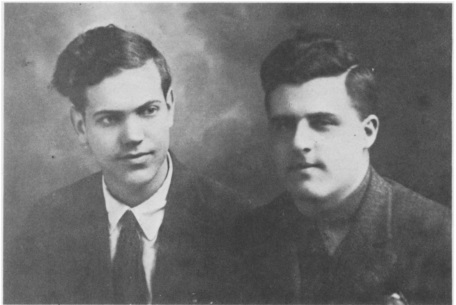[Albert R. Wetjen appeared 42 times in Adventure. He also wrote for other pulps (Argosy, Blue Book) and slicks (Collier’s, Saturday Evening Post). He ran away from home at the age of 14 to become a sailor, became an author at 22, and died at the age of 48.]
 |
| Albert R. Wetjen c. 1935 |
Albert Richard Wetjen was born on 20 August 1900 in London, England. His father and grandfather were sailors. His father had been to Australia in the Ballarat gold-rush, and his grandfather had been a pearler on the north-west coast of Australia.
He was determined to become a sailor, and at the age of 12 he left school. “When I was a kid of 14, I went to sea. I wanted to be a captain. I wanted to be like that gray-haired lug on the bridge with the golden oak-leaves on his cap, and the four bands on his arm and the row of ribbons on his breast, who only had to cough to make the ship practically capsize. Then they shoved a brass-cleaning box in my hand and told me to get going.”
He claimed to have been shipwrecked twice, once in the Bay of Fundy, by fire; another time he was wrecked off Cape Race due to fog. He claimed to have been wrecked in the Shaw Savill liner, the Mataroa, but that doesn’t seem possible since the Mataroa only commenced its maiden voyage in 1922. I could not verify either of these, and I suspect he may have made them up.
He later worked as a mechanic in a London garage and as a machinist’s mate in a dental factory in London. In 1918, he enlisted in the British army. Wetjen served with the Manchester Regiment, earning the Mercantile Marine Medal, the British War Medal and the Victory Medal. He also claimed to have been a member of the crew that took the sultan of Zanzibar to his exile in St. Helena after the Anglo-Zanzibar War of 1896 (a war that took thirty-eight minutes to fight).
After the war, he was unable to find work in London, and travelled to Africa, where he remained for a brief period. In 1920, he landed in Canada, at one of the ports on the east coast, and worked his way across the continent to British Columbia. Soon he crossed the border in Washington State and drifted south into Oregon, finding work in the hop fields near Harrisburg.
In 1921, he started writing. He had been reading Jack London’s Martin Eden at the time, and said to himself “Well, if one lug can make it, why not another?” He got a job with the Harrisburg Observer and became the local correspondent for many state papers. In 1922, he sold his first story to Wide World.
 |
| Albert R. Wetjen c. 1921 (on right) |
In 1923, he married Edythe Eisenbrandt. They lived in Salem till 1928, where he wrote fiction and edited some literary magazines, among them The Oregon Magazine and The Literary Monthly. He had become a literary lion in Oregon, mentoring young writers and publishers. While people admired his writing, they were put off by the crude image that he projected. There were also rumors of a wild, hedonistic lifestyle that put off many of his supporters. In 1926, he won the O’Henry memorial award for his story “Command” published in Sea Stories magazine.
In 1928, he and James Stevens took off on a trip to South America, but cut it short in 5 months.
In 1930, he moved to Hollywood to write scripts for movie production, but soon tired of the slow pace of movie production, and came back the same year.
In 1935, he sailed with his wife to Australia to get material for new stories.
By 1940, Wetjen’s star was in decline. He separated from his wife, and started drinking more. He died on March 8, 1948.
On being a writer, he had this to say:
“Write a story, tear it up and rewrite it 16 times. Maybe the 17th one will be worth sending out.”
“A writer should aim at the pulps first, then go to the slicks. It is easier to learn the fundamentals in writing for the pulps, and when you know these you won’t run dry after a flare. You get the bones and intestines of the profession in the pulps, the rouge you put on later. In the pulps you tell how it is done, and in the slicks you tell why. ”
“When you write about people, you’ve got to know what makes them tick and biology is just as important as psychology and literature. The important thing for a writer is not what a man or woman does, but the way he or she does it.”
“The trouble with most people who want to write is that they don’t know what a story is. And many of them look all over for something to write about, when it is right in their own back yard. Great drama in life lies in your own heart.”
His method of writing was unique, typing out stories by touch in a darkened room. He explained that he began writing while living alone in a shack near Salem, Oregon. His only illumination in the shack was a smoky oil lamp, and he got used to writing in that. Later he stuck to that, as his imagination seemed to work best in semi-darkness.
Dick Wetjen was my grandfather Murray Wade's best friend for years. Dick even served as editor of grandpa's Oregon Magazine for a few years. I have three stories typed by Albert Richard Wetjen, unpublished as far as I can tell. I also have a typed list by Wetjen of his stories and publication names and dates, as well as many letters Wetjen sent to my grandpa. Make me an offer! jmaylovesdogs@gmail.com
ReplyDelete